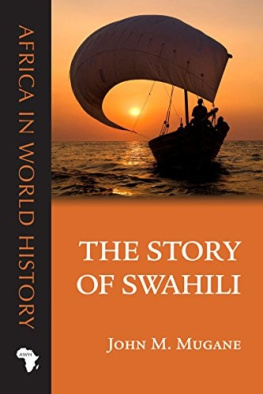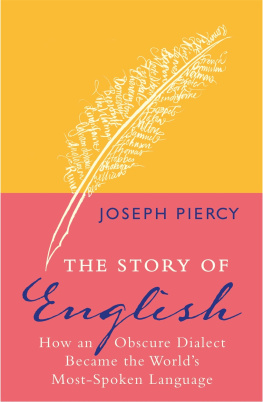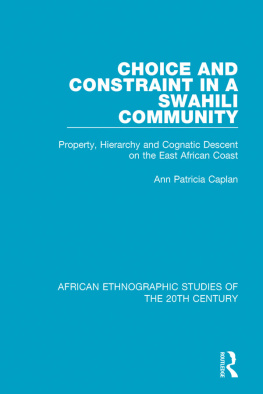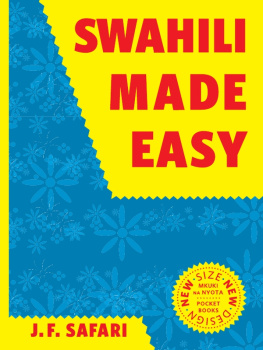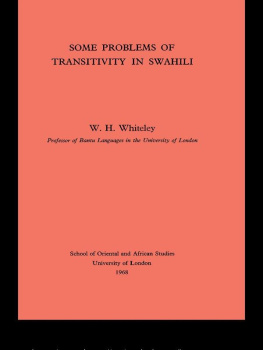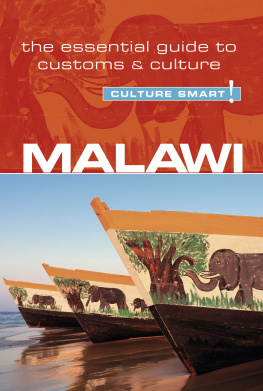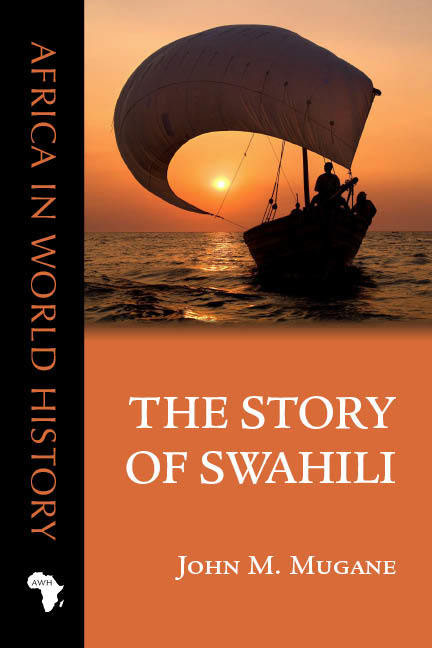Africa in World History
Series editors: David Robinson and Joseph C. Miller
James C. McCann
Stirring the Pot: A History of African Cuisine
Peter Alegi
African Soccerscapes: How a Continent Changed the Worlds Game
Todd Cleveland
Stones of Contention: A History of Africas Diamonds
Laura Lee P. Huttenbach
The Boy Is Gone: Conversations with a Mau Mau General
John M. Mugane
The Story of Swahili
Forthcoming
Charles Ambler
Mass Media and Popular Culture in Modern Africa
The Story of Swahili
John M. Mugane
Ohio University Press Athens, Ohio
in association with the
Ohio University Center for International Studies
Athens
brought to contrast with a grant from
Figure Foundation
in language do all the times daydream
Ohio University Press, Athens, Ohio 45701
ohioswallow.com
2015 by Ohio University Press
All rights reserved
To obtain permission to quote, reprint, or otherwise reproduce or distribute material from Ohio University Press publications, please contact our rights and permissions department at (740) 593-1154 or (740) 593-4536 (fax).
Cover photograph of Pumulani dhow from AfricaboundAdventures.com
Cover design by Beth Pratt
Printed in the United States of America
Ohio University Press books are printed on acid-free paper
25 24 23 22 21 20 19 18 17 16 15 5 4 3 2 1
Library of Congress Cataloging-in-Publication Data
Mugane, John M., author.
The story of Swahili / John M. Mugane.
pages cm. (Africa in world history)
Includes bibliographical references and index.
ISBN 978-0-89680-292-6 (hc : alk. paper) ISBN 978-0-89680-293-3 (pb : alk. paper) ISBN 978-0-89680-489-0 (pdf)
1. Swahili languageHistory. 2. Swahili languageSocial aspects. 3. Swahili-speaking peoplesHistory. I. Title. II. Series: Africa in world history.
PL8701.M77 2015
496.392dc23
2015014795
To our sons Amani wa Muratha and Daudi wa Muratha
and Judith aka maGane
my bountiful blessing!
Illustrations
Figures
2.1 The linguistic family tree of Swahili
4.1 Anatomy of the boat in Swahili
6.1 A kanga bearing the inscription Palipo na Upendo Mungu Yupo, Wherever There Is Love God Is There
8.1 Bismillah, the preface to most Swahili writings using the Arabic script
8.2 First line of Al Inkishafi, a poem by Sayyid Abdalla bin Ali bin Nasir, ca. 1800
8.3 A personal letter sent by Said bin Isa to Muhammad bin Khalfn bin Khams al-Barwni
8.4 Arabic alphabet
8.5 Swahili speech sounds
8.6 Arabic sounds used to represent more than one Swahili sound
8.7 Muyaka bin Hajis adaptation of Swahili to the Arabic script
8.8 First and second lines of the third stanza of Al Inkishafi, a poem by Sayyid Abdalla bin Ali bin Nasir, ca. 1800
8.9 Third and fourth lines of the second stanza of Al Inkishafi
8.10 Muyaka bin Hajis representation of Swahili aspirates using Arabic script
8.11 Muyaka bin Hajis representation of Swahili nasals using Arabic script
8.12 Stacking of symbols to represent consonant clusters
Maps
1.1 The Swahili Coast
2.1 Africas Swahili-speaking region
2.2 East Africa trade, 10001500 CE
2.3 Lahaja za Kiswahili (Swahili dialects)
4.1 Coconut migration
5.1 Swahili slave trade, ca. 1870
5.2 Kisiwa cha Unguja (Zanzibar Island), ca. 1870s
9.1 Area of potential utility of Swahili
Table
6.1 Kipate dialect compared to Kiunguja
Acknowledgments
An old Gky saying has it that And no indo, People are the wealth, and boy am I ever rich! I am the beneficiary of the kindness of many, and to thank them is important, bragging though it be. My colleagues, associates, students, friends, and family cut across many intellectual traditions, cultures, languages, and religious persuasions. I want to mention a few who came through for me in important ways as I worked to complete this book.
First and foremost, I owe a great debt of gratitude to Joseph Miller and David Robinson, the editors of the Africa in World History series who got me fascinated by the idea that I, a linguist, might use my knowledge of Swahili to tell the history of the AfricanIndian Ocean world to a general audience. Joe and Dave have been phenomenally generous with their time and resources of the mind, and I have learned a great deal in the process and developed a love of history. They are inspired and inspiring scholars. I am far more grateful to them than the spoken word can say. I am also very grateful to Emmanuel Akyeampong, my friend and colleague, for his encouragement to persevere and for reading the manuscript at a critical stage of the writing process and providing me with vital advice. I extend my thanks, as well, to my colleague Jacob Olupona for his interest in and mindful awareness of the progress of this book. And to the wonderful Africanist colleagues at Harvard who are rather too many to list.
I acknowledge the input of my teachers Issa Haji Zidi and Ali Mwalimu Rashidi and their students at the State University of Zanzibar and also Mzee Gora of Zanzibar for his manuscripts of Swahili written in Arabic letters. Their knowledge of the islands multilingual and multiracial ethnic mix displayed in Swahili and their hospitality have been extremely helpful to me. I would like to thank my colleagues at Nairobi University and the University of Dar es Salaam for affording me time to articulate and explain my heresies in the great enterprise of the language question in Africa having to do with language study and linguistic description. I thank Mahmood Mamdani for inviting me to Columbia University to tell the story, Fallou Ngom for sharing his unparalleled knowledge of the Pan-African Ajami writings, and John Thornton for his wonderful insights into Congo and his experience with its languages on the ground.
I also acknowledge the input given by the many present and former graduate and undergraduate students who have read various versions of this book in my courses or in graduate seminars where I have presented it in the past. Among the students are Nkatha Kabira, Ayodeji Ogunnaike, Lowell Brower, Stephanie Bosch, Chambi Chachage, and Oludamini Ogunnaike. Former students (now colleagues) include Laura Murphy, Carla Martin, and Cherie Rivers. I am also grateful to Laurie Carafone, Katherine Petti, and G. Robert Mmari (University of MassachusettsAmherst) and Jonathan Kimani (Bunker Hill) for their editorial work. And my appreciation goes to Ayodeji Ogunnaike for all the help with Arabic in understanding Swahili Ajami and to Mohamed Khalifa for lessons on the Arabic script. I thank my undergraduate and graduate students in the Introduction to Africans course for responding to earlier versions of this book and helping me make it an appealing read.
Then there is family in Kenya, Tanzania, and abroad; they are my secret. Luckily there is a rule against counting family members so I cannot mention names except the one Gathoni, my mother. It is through her that I thank my families. Saying thank you to family is seldom, if ever, enough even though it means so much. I feel woefully inadequate saying Asanteni! but I hope the simplicity of this expression will suffice for all of my family. Still, to my wife, Judy, and our sons, Amani and Daudi, I dedicate this book saying in vernacular: Thengi! (modest though it be) for your unqualified enthusiasm and support. The writing is done, so let the reading commence. I can hear my friends saying tosha! enough already!

